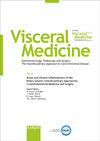Surgical Therapy of Early Carcinoma of the Esophagus
引用次数: 11
Abstract
Background: The modern therapy of early esophageal carcinomas (pT1) requires an excellent cooperation between experienced gastroenterologists, pathologists, and esophageal surgeons. While endoscopic resection (ER) is accepted as the standard curative treatment for mucosal esophageal carcinomas, submucosal tumors are regarded as a strict indication for surgery. There is an ongoing discussion about the operative approach and the extent of lymph node dissection in these cases. Methods: A literature review was performed to evaluate the operative treatment of early esophageal cancer. In view of oncological risk factors, treatment strategies, and operative procedures, current studies are summarized and compared to the results of our own center. Results and Conclusion: In early esophageal cancer, lymph node involvement is the only independent risk factor for survival and recurrence rates. There is evidence that infiltrated lymph nodes (N+) are significantly correlated with tumor infiltration depth, lymphovascular (L1) and microvascular invasion (V1), and poor tumor differentiation (G3). Several studies suggest that early squamous cell carcinomas (eSCCs) and early adenocarcinomas (eACs) have a different tumor biology and therefore need a different treatment strategy. While eSCCs in stage m1 and m2 can be cured by ER, tumors infiltrating the submucosal layer (sm1-3) show a high rate of lymph node metastasis (LNM); thus, surgical resection (SR) is clearly indicated. In tumors with invasion into the deep mucosa (m3) the risk of LNM is up to 11%; however, reliable data are rare and the type of therapy should be discussed with the patients individually. In eACs, ER is the standard curative treatment for all mucosal tumors (m1-m4) and sm1 tumors with low-risk constellation (G1, L0, VO, R0). All high-risk sm1 tumors and those with deeper submucosal infiltration (sm2, sm3) show a high rate of LNM and require SR. The standard operative proce- dure for early esophageal carcinomas is an Ivor-Lewis esophagectomy with radical, at least two-field lymphadenectomy.早期食管癌的外科治疗
背景:早期食管癌(pT1)的现代治疗需要经验丰富的胃肠病学家、病理学家和食管外科医生之间的良好合作。虽然内镜切除(ER)被认为是粘膜食管癌的标准治疗方法,但粘膜下肿瘤被认为是严格的手术指征。在这些病例中,关于手术入路和淋巴结清扫程度的讨论正在进行中。方法:回顾文献,探讨早期食管癌的手术治疗。针对肿瘤的危险因素、治疗策略和手术程序,总结了目前的研究结果,并与本中心的结果进行了比较。结果与结论:在早期食管癌中,淋巴结受累是影响患者生存和复发率的唯一独立危险因素。有证据表明浸润淋巴结(N+)与肿瘤浸润深度、淋巴血管(L1)和微血管浸润(V1)、肿瘤分化不良(G3)显著相关。一些研究表明,早期鳞状细胞癌(escc)和早期腺癌(eACs)具有不同的肿瘤生物学,因此需要不同的治疗策略。虽然m1期和m2期escc可以通过ER治愈,但浸润粘膜下层的肿瘤(sm1-3)表现出较高的淋巴结转移率(LNM);因此,手术切除(SR)是明确的适应症。侵袭深部粘膜(m3)的肿瘤发生LNM的风险高达11%;然而,可靠的数据很少,治疗类型应与患者单独讨论。在eACs中,ER是所有低危群(G1, L0, VO, R0)的粘膜肿瘤(m1-m4)和sm1肿瘤的标准根治性治疗。所有高风险的sm1肿瘤和较深的粘膜下浸润(sm2, sm3)均显示出较高的LNM发生率,需要进行sr治疗。早期食管癌的标准手术方案是Ivor-Lewis食管切除术加根治性至少两野淋巴结切除术。
本文章由计算机程序翻译,如有差异,请以英文原文为准。
求助全文
约1分钟内获得全文
求助全文

 求助内容:
求助内容: 应助结果提醒方式:
应助结果提醒方式:


